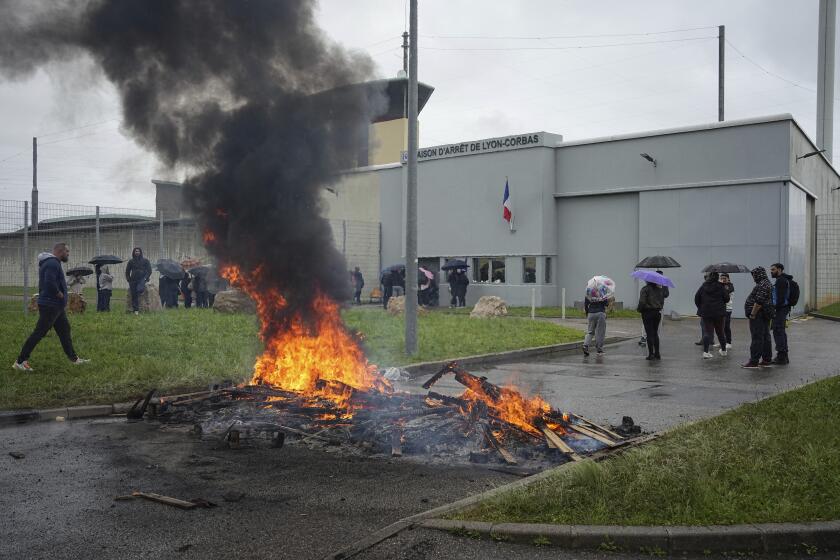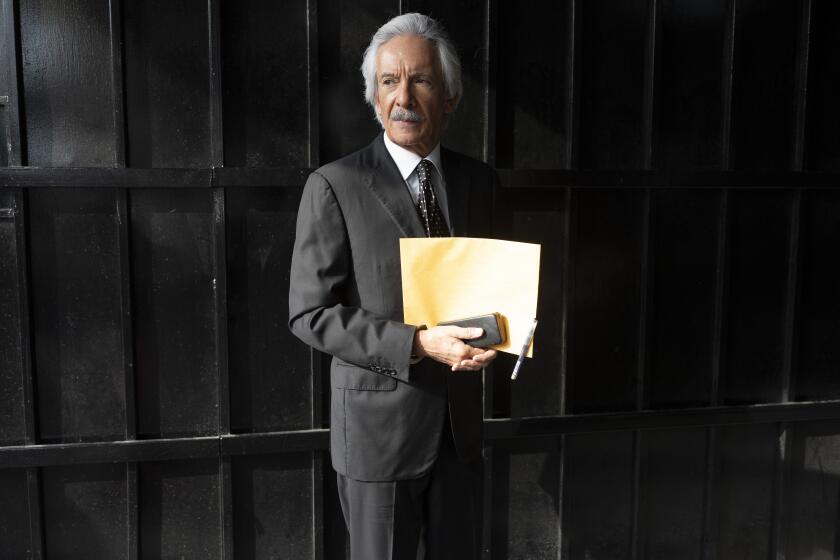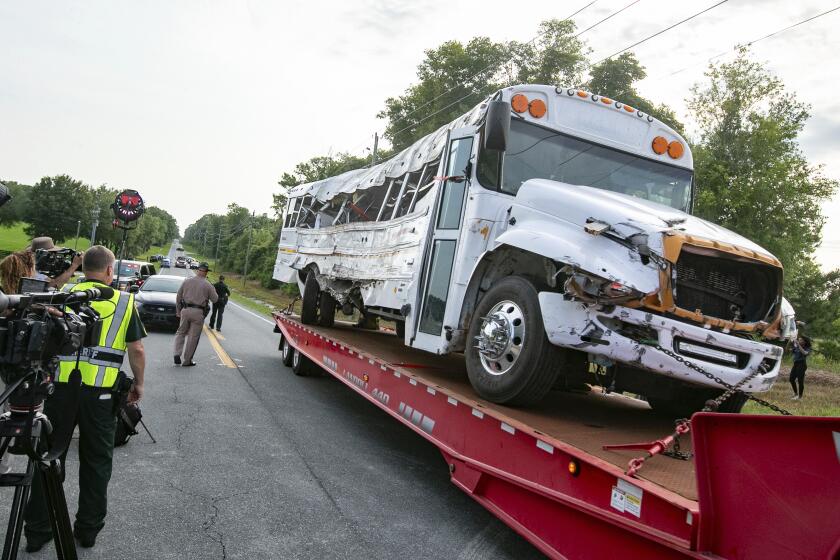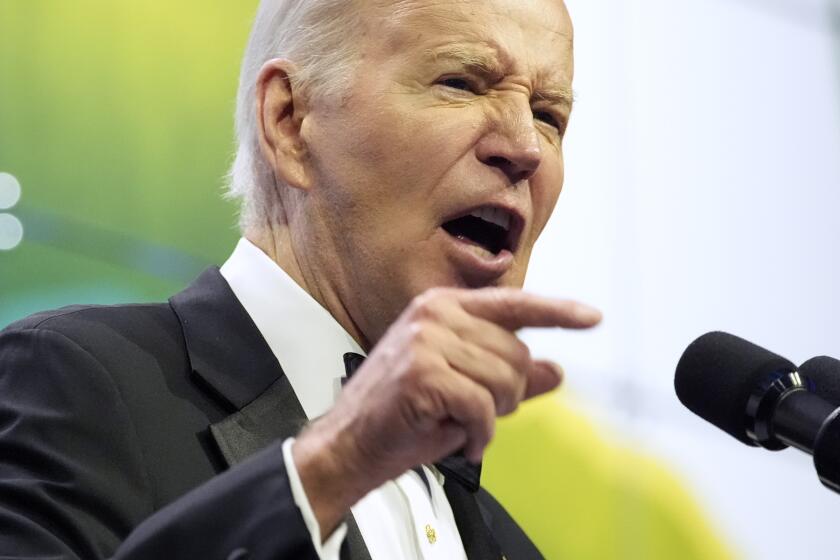At Hospital, Tragedy Is Multiplied
Twelve-year-old Haneen Maan Abdul remembered no sound. Just a whoosh that tossed her small body out of her hospital bed. Then a blinding dust. Then the screams for help.
Like many patients at a spinal cord injury hospital next to the Canal Hotel, Tuesday’s bombing wrought double tragedy for the young Iraqi girl.
Two months ago, Haneen was playing on the roof of her family’s house when a U.S. helicopter swooped down during a raid on a nearby house. Frightened by the rotor, the girl slipped off the roof and broke her back.
On Tuesday, Haneen -- wearing a back brace over her purple pajamas -- was one of about 80 patients at the National Hospital for Spinal Cord Injuries when the roof caved in from the blast, leaving it buried under wood, ceiling tiles and debris.
The luckiest, like Haneen, who suffered cuts on her head, arms and legs, were those with visiting relatives or friends who could carry their loved ones to safety. Many more were left helpless and immobile, trying to crawl out on their own.
“It was like doomsday,” said Majid Hamed, whose 16-year-old-son was partially paralyzed in a car accident a year ago. “Everybody was screaming.”
Doctors at Al Kindi Hospital, where many of the bombing victims were brought, could only speculate about what additional injuries the spinal cord patients had suffered from the blast impact and rushed evacuation.
“It’s very bad,” one emergency room doctor said while rushing between patients at Al Kindi, the nearest major hospital to the Canal Hotel.
At the hotel, where the United Nations has based its operations in Iraq for more than a decade, many employees were wrapping up their daily duties before getting ready to head home.
Those working in offices facing the street took the brunt of the blast, which sent glass and shrapnel shooting into the building.
Darko Mocibob, a Bosnian who usually works on Iraqi affairs at the U.N. in New York, was talking on the phone. Glass shards tore a 9-inch-long gash across his upper back.
“Suddenly there was all this dust,” he said. “I was disoriented. Somehow I stumbled out.”
Jean Jacques Frere, a French physician who had arrived in Iraq for the U.N. three days earlier to help improve the country’s public health system, stood in the hospital emergency room Tuesday, his head wrapped in gauze. He was still holding a bloodied briefcase.
“I guess I’ll have to dress this myself,” he said, holding up a badly wounded left hand.
He said U.N. officials had been increasingly concerned that the hotel might become a target but that there had been no warning before the attack.
“So now the whole donor community has become a target,” he said.
At the spinal cord hospital, Haneen was just about to eat dinner with her parents and younger brother when the blast tore apart the hotel next door.
“We didn’t hear anything,” said her father, Maan Abdul Hafidh. “All of a sudden, the ceiling collapsed.”
‘Make Them Go Away!’
He scrambled to reach his daughter, and they rushed out of the building. But on the street, rescue helicopters were airlifting the injured, and Haneen -- recalling her original accident -- began to shake and scream. “Make the helicopters go away!” she cried. “Make them go away!”
Arriving at the hospital by ambulance, the family despaired when Haneen reported that she could not feel her legs, a symptom she had not previously experienced. But 90 minutes later, feeling returned to her legs and she was displaying remarkable resilience, much to the relief of her family. Chipping at her red fingernail polish, she smiled sheepishly when a stranger asked her name.
“I was very frightened,” she said. “But praise be to God, I’m better now.”
Isam Jameel, 29, who had been stabbed in the neck last month, was not so lucky.
He and his brother Usana were watching TV at the hospital. “Everything happened in a fraction of a second,” Usana Jameel recalled later, cradling his brother in his arms at the Al Kindi emergency room.
After the blast, he carried his brother outside to emerge in chaos. “People were fighting to get on the ambulances,” he said. “A couple of Red Cross helicopters landed, but they left without taking anyone.”
At the emergency room, Isam, one side of his body covered in severe bed sores, shifted in pain. He gasped into an oxygen mask. “He can’t breathe!” his brother screamed at doctors. “Please help him.”
Overtaxed Staff
But the staff was stretched to its limit Tuesday as dozens of wounded filled the hospital beds, hallways and operating rooms. Patients writhed in pain as their relatives fanned them with cardboard scraps to alleviate the stifling heat.
In a tiny makeshift triage center, doctors stitched deep cuts on stunned patients grimacing from the lack of adequate painkillers. The floors and beds were soaked with blood, but there was no time to clean them before the next victim arrived.
Nearby, an Iraqi police officer lay in his underwear on a stretcher, his new blue uniform cut off by emergency room doctors. A wound to his face left him unable to speak; he scribbled his name on a pad of paper so hospital workers could notify his family.
In the hallways and parking lots of the hospital, family and friends of victims searched frantically for their loved ones.
“This is my son Heider,” cried one mother, wandering up and down the parking lots with a photo of a young man. “Do you know him? Have you seen him? Please tell me.”
In the waiting rooms, there was anger and shock.
“Look at what the Americans have brought!” one woman screamed. “Saddam has gone, and now there is no security.”
At the nearby Yarmuk Hospital, Dr. Arkan Badr Hassan warned that Iraqi hospitals would not be able to cope with the new climate of violence. Less than two weeks ago, his hospital was flooded with victims from the Jordanian Embassy bombing. On Tuesday, five new patients arrived from the Canal Hotel.
“It’s a dirty game we are seeing,” Hassan said. “All these victims have nothing to do with politics. We are still in a war.”
More to Read
Start your day right
Sign up for Essential California for news, features and recommendations from the L.A. Times and beyond in your inbox six days a week.
You may occasionally receive promotional content from the Los Angeles Times.






